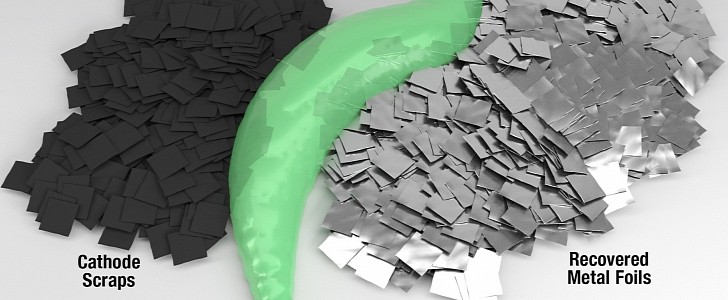Electric vehicle detractors often claim that it is impossible to recycle batteries, which would make them an environmental solution that could eventually be worse than combustion-engined cars. That is not correct: battery tech is being developed as much as new ways to reuse the precious materials used by then. The ORNL (Oak Ridge National Laboratory) proved that after announcing a new solvent that managed to separate cathode materials from metal foils in a very effective way.
Before this method, most cells were recycled with smelting, a process that submits the batteries to high temperatures so that their components can melt and be extracted. The downside is that this emits greenhouse gases, sulfur dioxide, arsenic, lead, and mercury. We have no idea if there’s any method to prevent that.
With the solvent developed by the ORNL researchers, the binder material that keeps the cell together is eliminated, leaving just the cobalt-based cathodes, graphite, nickel, manganese, and other cell components. Even the polymeric binder can be recovered. The solvent uses triethyl phosphate (TEP).
Apart from reducing the need for mining, the wet chemical recycling process also saves the energy that would be spent in submitting the batteries to high temperatures.
The researchers have not disclosed if the new process saves time or money when compared to smelting. However, the environmental advantages are evident. If the process is also faster and cheaper, that will back up one of the hopes of the study, published in the journal ACS Sustainable Chemistry & Engineering.
According to the scientists, “this green solvent-based separation for cathode recovery will attract significant interest by the lithium-ion battery manufacturing and recycling communities.” If it also makes them cheaper and electric cars more affordable, the recycling process could finally silence EV detractors. Sadly, based on our experience, that’s not going to happen: they’ll always find something else to criticize, even if based on wrong assumptions.
With the solvent developed by the ORNL researchers, the binder material that keeps the cell together is eliminated, leaving just the cobalt-based cathodes, graphite, nickel, manganese, and other cell components. Even the polymeric binder can be recovered. The solvent uses triethyl phosphate (TEP).
Apart from reducing the need for mining, the wet chemical recycling process also saves the energy that would be spent in submitting the batteries to high temperatures.
The researchers have not disclosed if the new process saves time or money when compared to smelting. However, the environmental advantages are evident. If the process is also faster and cheaper, that will back up one of the hopes of the study, published in the journal ACS Sustainable Chemistry & Engineering.
According to the scientists, “this green solvent-based separation for cathode recovery will attract significant interest by the lithium-ion battery manufacturing and recycling communities.” If it also makes them cheaper and electric cars more affordable, the recycling process could finally silence EV detractors. Sadly, based on our experience, that’s not going to happen: they’ll always find something else to criticize, even if based on wrong assumptions.

